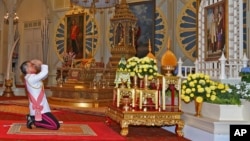Thailand's military-ruled legislature has approved constitutional changes desired by the newly enthroned king that would reserve more powers for him.
One change made Friday by the National Legislative Assembly allows King Maha Vajiralongkorn Bodindradebayavarangkun to decide whether or not to appoint a regent in his absence.
The constitution previously stated that if no regent was appointed, the head of the Privy Council - the king's advisory body _ would become regent. The amendment effectively keeps royal power in the hands of the king or a trusted confidante when he is abroad. Vajiralongkorn traveled frequently before becoming king in December.
A second amendment makes it easier to implement the king's desired changes in the next constitution, which passed a referendum last August. The government says the changes concern royal powers.






